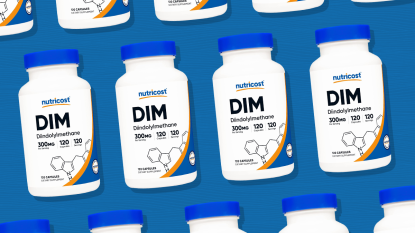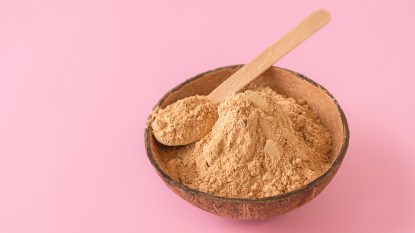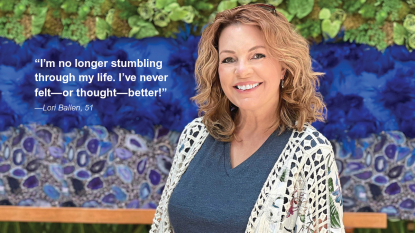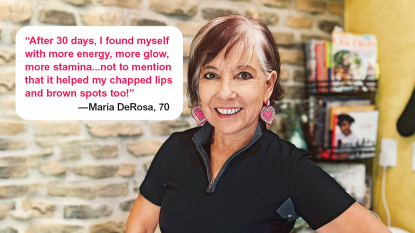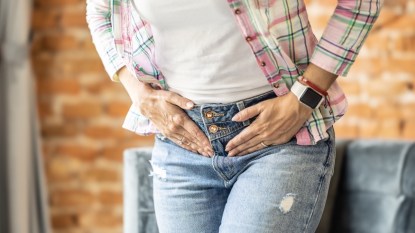Gaining Weight Is Inevitable — And 3 Other Menopause Myths You Probably Believe
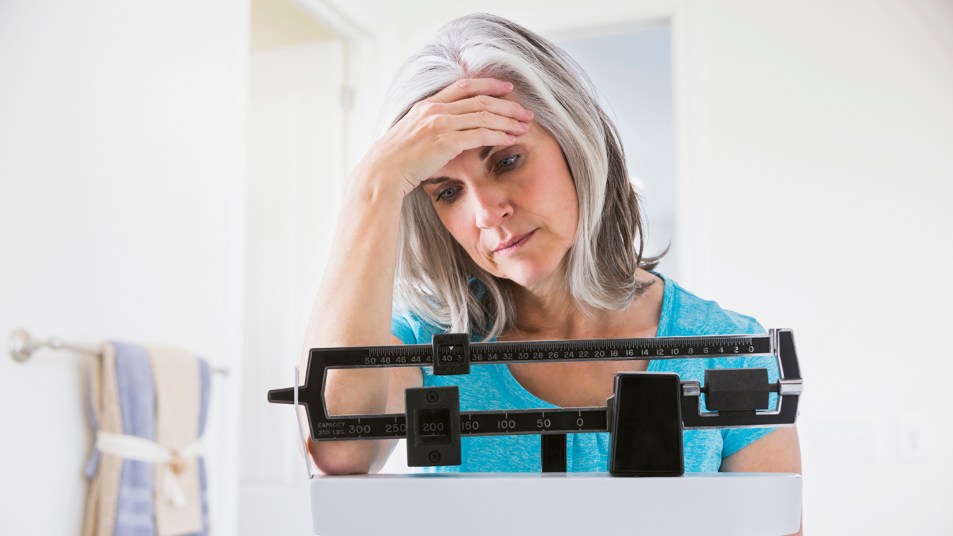
When it comes to menopause, weight gain is one of our biggest fears — and those dreaded extra pounds are only one of slew of other symptoms we often worry about during menopause. Hot flashes, low libido, and other dramatic changes in our bodies loom ahead as we embark on this new journey. But are these things really inevitable? Is menopause weight gain just a fact of life, or is there something we can do to avoid it?
We sat down with Catherine Balsam-Schwaber, the CEO and founder of Kindra – a one-stop shop for all things menopause, to discuss the topic. Balsam-Schwaber is on a mission to debunk myths, help you understand what’s going on with your body, and give you the space to talk about your menopause journey.
“Menopause isn’t a unique niche aspect of a woman’s life,” she tells Woman’s World. “It’s something that happens to 50 percent of the population. And it’s a shared experience that we’re essentially conditioned not to share … If we’re not talking to each other about what’s happening in our bodies, and we don’t have the information and the education that we need to take care of ourselves, it leaves [us] in a pretty constant disadvantage as we age.”
The more we learn more about menopause, the more we’re able to understand the symptoms we may experience, including weight gain (which may or may not happen to you!). Educating yourself can help illuminate the problems behind your specific symptoms — and that knowledge will empower you to get the treatment and personalized care you need. So, let’s debunk some myths!
Myth 1: Menopause Weight Gain is Permanent
First of all, weight gain during menopause isn’t a guarantee. While many women experience a bump in weight as their bodies start to change, others don’t. Hormonal changes don’t necessarily mean you’ll pack on a few pounds around the waist (the dreaded “menopause middle” you may have heard about). That’s because a weight shift is also tied to your genetics, lifestyle, and diet.
But for those who do experience that shift, what causes weight gain during menopause? “It’s hard to say that menopause specifically is the cause of weight gain,” Balsam-Schwaber says. “The loss of estrogen is affecting everything that happens in your body.” Indeed, she points out that low estrogen can slow down metabolism, decrease muscle mass, and disturb sleep habits. A combination of those factors can contribute to weight gain.
With this in mind, Balsam-Schwaber believes that addressing individual symptoms will help you manage your weight. “If your sleep is disrupted, you tend to eat more sugar and feel more irritable,” she explains. Establishing a better sleep routine may help you cut the amount of sugar you eat, which in turn will help keep your weight down.
Balsam-Schwaber recommends thinking of your post-menopausal body the same way you would a post-pregnancy body. You wouldn’t body shame yourself if you just had a baby, would you? “With my post-baby body, I had to relearn how to maintain and manage my weight. I feel like this is very similar,” says the mother of twins.
And while menopausal weight gain is very different from pregnancy weight gain, they both require a period of getting to know your body again, and learn new approaches to weight management. Your menopausal body, like a post-pregnancy body, will hold onto weight differently. “The reality is that your body is changing,” she adds.
Myth 2: Hot Flashes Are Not Treatable
Many women believe hot flashes are just one more thing they have to weather until their symptoms die down. After all, lots of women go through them, so they must be pretty difficult to treat. Right?
Actually, those sudden bursts of heat can be treated, even though they’re complex. But what causes hot flashes in the first place? Research shows that estrogen controls the area of your brain that regulates body temperature. Low levels of estrogen can make it difficult for your body to regulate its temperature. That leads to the extremely uncomfortable feeling of suddenly sweltering, and breaking out in a sweat. But that’s not the end of the story.
“There are multiple factors going on,” says Balsam-Schwaber. “Hot flashes are not solely a vascular problem. They are also impacted by feelings of anxiety, and sometimes depression. Many women develop anxiety about having a hot flash or a night sweat. So, if you went to bed feeling anxious that you might wake up in the middle of the night with a night sweat, it can contribute to the experience that you have.”
It may take a multi-faceted approach to treat your hot flashes. Addressing feelings of anxiety and depression can help, and so can taking supplements. “It is a combination of solutions, like our [Core] supplement combined with really understanding what’s happening in your body during a hot flash, that can [help you] manage it the best way for you,” Balsam-Schwaber says.
Myth 3: Menopause Diminishes Your Sex Drive
Have you heard that sex drive after menopause is nonexistent? It’s time to flip the switch on that idea. “That is definitely a myth,” Balsam-Schwaber says. “Of course, everything is a combination of factors.” These can include vaginal dryness (also caused by low estrogen levels!), feeling uncomfortable with your body, anxiety surrounding sex, and a lack of communication with your partner.
“The vast majority of women experience vaginal dryness,” Balsam-Schwaber explains. “Ninety percent of women who experience vaginal dryness don’t seek care for it. Which means that women for too long have lived with this idea that sex could become uncomfortable as we age, which doesn’t have to be true.”
So, how do you begin to address the complicated relationship between menopause and libido? “I think that phase one is making sure you’re taking care of your vaginal health,” she says. “When you think about how much time and attention we give our faces, we don’t do that same level of care to our vaginal skin. And it can become very dry and uncomfortable. Our [Daily Vaginal Lotion] for example, absorbs into your skin and helps to rebuild the barrier and improve elasticity in your vaginal tissue.
“Phase two is rethinking your intimate relationship with your partner. Being able to talk to your partner is a critical component. If you can’t feel comfortable talking about changes in your body, it makes it very difficult to find a new, comfortable, sexy self.” It’s time to break down that barrier and open up!
Myth 4: Menopause Weight Gain, Hot Flashes, and Low Libido Are the Only Symptoms You Need to Worry About
Though we may think extra pounds, hot flashes, and a lowered sex drive are the biggest symptoms of menopause, they are certainly not the only ones. “In the United States there are 34 ‘symptoms of menopause’ classified,” Balsam-Schwaber says. “In the UK, there are 48.” Some of these symptoms of menopause include irregular periods, night sweats, difficulty sleeping, fatigue, problems with memory, difficulty concentrating, and headaches — just to name a few. Many women have reported other symptoms that aren’t even on the list.
Why is it so important to understand all the menopause symptoms? Knowing only the big three signs can lead to a misdiagnosis — something that happened to Balsam-Schwaber herself. “When I was starting my own menopause journey in my late 40s, I started to get very achy,” she says. “I felt like I had a low-grade fever all the time. And when I went to my doctor, he misdiagnosed me. He felt that I had fibromyalgia, which I didn’t. He just sort of had a knee-jerk reaction to what I was explaining was going on in my body.
“When I left, I felt like, ‘That’s weird, I don’t think that’s what’s going on.’ Because to me, it felt like there was something wrong with my clock. That’s how I described it to him. And I had to do a lot of self-education to try and figure out what other things could be going on in my body. What I learned in that process is that there was very limited information that would affirm that menopause might be what’s starting to happen in my body.”
How Kindra Debunks Myths and Addresses Menopause Symptoms
To understand a condition as big as menopause, we need reliable resources. That’s where Kindra comes in. The menopause management company offers a wealth of information on the subject, a community for support, and well-tested products.
“We work with a group of medical professionals across the board – OBs, internists, dermatologists, and nutritionists – because menopause is something that’s happening to your whole body,” Balsam-Schwaber says. “The second piece of it is community, which is really being able to help women [and] hear other women’s stories about how they’re managing the changes that they’re seeing … If no one is talking about it, it feels like it’s happening to you in isolation. So, hearing other women’s stories, even if it’s not in a group setting, is very affirming to women.”
“The third part is solutions that really work. We sell products that are physician tested, scientifically derived, and have five to seven years of consumer product testing before they even come to market. We’re very confident that the products we are offering women are effective.”
Curious about what Kindra has to offer? Check out the shop to explore their products, or, take Kindra’s comprehensive quiz if you’re unsure what’s right for you. With the a few tools, good information, and guidance, you’ll be far more prepared for your menopause journey than you ever imagined you could be.



